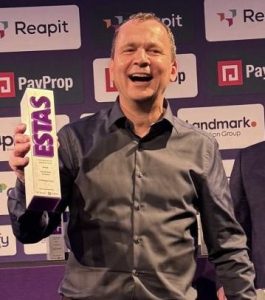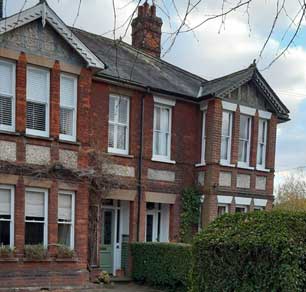> BUYING & SELLING PROPERTY
TIPS AND ADVICE
The team of conveyancing solicitors at our Brighton office are experts in handling all legal aspects of buying and selling residential property throughout Brighton & Hove and the surrounding area.
Moving home or remortgaging? Order your fixed-fee conveyancing quote today for complete peace of mind. Our in-house team will look after you throughout your property journey.
Brighton Conveyancing Services: Fixed-Fee Quotes

Our property solicitors in Brighton & Hove provide comprehensive legal support for all your conveyancing needs. From purchasing or selling freehold and leasehold properties to remortgages, transfers of equity, and agreed lease extensions, the Cunningtons Brighton conveyancing team ensures a smooth transaction from start to finish.
Finding the right conveyancing solicitor in Brighton can be challenging with a number of different firms available.
At Cunningtons, we make your choice simple:
- Regulated by the Solicitors Regulation Authority (SRA);
- Accredited by the Law Society’s Conveyancing Quality Scheme;
- Over 250 years of property transaction experience;
- Award-winning Brighton conveyancing team;
- Fixed-fee Brighton conveyancing quotes with no hidden costs.
Get your obligation-free Brighton conveyancing quote now
Award-Winning Brighton Conveyancing

Our commitment to excellence in Brighton conveyancing has been recognized with the ESTAS gold award for Conveyancer of the Year in the South East of England, 2024. This prestigious award reflects our dedication to providing exceptional service for property transactions throughout Brighton & Hove and East Sussex.
When you choose Cunningtons for your Brighton conveyancing quote, you know that you’re selecting an award-winning conveyancing team with a proven track record of client satisfaction and legal expertise.
Why Choose Us as Your Local Brighton Conveyancing Solicitors?

When buying or selling a property in Brighton, working with local conveyancing solicitors face-to-face offers significant advantages over online services:
Personal Service from Brighton Conveyancing Experts
Choosing Cunningtons Brighton & Hove conveyancing solicitors means you’ll work with one dedicated professional throughout your entire transaction. You’ll know exactly who is handling your case – someone you’ve met in person at our Duke Street office or spoken with directly on the phone.
In-Depth Knowledge of the Brighton Property Market
Our Brighton conveyancing team has years of experience dealing with:
- Brighton & Hove City Council requirements;
- Local property searches specific to Brighton & Hove;
- Common issues with Brighton’s period properties;
- Leasehold considerations for Brighton seafront apartments;
- Conservation area restrictions in central Brighton; as well as
- New build developments across Brighton & Hove and the surrounding area.
Cost-Effective Brighton Conveyancing Quotes
While online conveyancing firms might advertise lower initial fees, they often add unexpected charges later on.
Our Brighton conveyancing quotes are transparent from the start. Our quotes offer you:
- Fixed fee guarantee, with no hidden costs
- A clear breakdown of all legal costs and disbursements;
- No surprise additional fees; along with
- Competitive rates for high-quality legal work.
Request your Brighton conveyancing quote today
Our Brighton Conveyancing Quote Process

Getting your Brighton conveyancing quote is quick and simple.
- Complete our online quote form with basic property details;
- Receive your comprehensive fixed-fee quote within 24 hours;
- Review your quote with no obligation to accept it;
- If you are satisfied with your quote, instruct us to begin your conveyancing in Brighton; then you …
- Work with your dedicated Brighton conveyancing solicitor throughout the process.
Your conveyancing quote will vary depending on whether you’re buying, selling, or remortgaging a property, and whether it’s freehold or leasehold. Every quote provides a clear breakdown of all costs involved.
Our Comprehensive Brighton Conveyancing Services
Conveyancing for Buying Property in Brighton
When buying your new home in Brighton & Hove, our conveyancing solicitors handle all legal aspects needed for your purchase. This includes:
- Title verification and property searches specific to Brighton & Hove;
- Communication with your mortgage lender;
- Review of the draft contract from your seller’s solicitor;
- Raising and responding to other legal enquiries;
- Arranging deposit transfer for your exchange of contracts;
- Preparing completion statements and transferring funds;
- Submitting Stamp Duty Land Tax payments; and finally …
- Registering your ownership of your new property with HM Land Registry
Of course, we provide expert legal support for first-time buyers, help to buy schemes, new build purchases, shared ownership, and property investors throughout the city of Brighton & Hove, as well as East and West Sussex.
Conveyancing for Selling Property in Brighton
Our Brighton conveyancing team provides equally comprehensive services when you are selling your property:
- Obtaining your title deeds and preparing the draft contract;
- Responding to the buyer’s solicitor’s enquiries;
- Negotiating contract terms and completion dates;
- Managing the exchange of contracts;
- Handling financial settlements with your mortgage lender;
- Co-ordinating with your estate agent for handing over the keys to the new owners; and
- Providing you with detailed financial statements for all transactions.
Get A Quote
Click here to order your quote from our residential conveyancing solicitors
Brighton Conveyancing for Remortgaging
Conveyancing for remortgaging your Brighton property is simpler and takes less time, as there are usually no chains, estate agents, moving companies, or other buyers and sellers to consider. We:
- Obtain your title information from the Land Registry;
- Conduct any necessary property searches;
- Review your new mortgage offer;
- Prepare and explain all your legal documentation;
- Arrange the secure transfer of funds; then
- Register your revised mortgage with the Land Registry.
GET IN TOUCH
To contact us about any of our legal services including Family Law or Wills and Probate,
just complete this form so we can get back to you.
The Brighton & Hove Property Market
Brighton’s diverse property market presents unique considerations for conveyancing, and we’ve dealt with most of them:
- Period properties in conservation areas like The Lanes;
- Regency buildings with specific leasehold arrangements;
- Seafront apartments with important maintenance considerations;
- New developments around Brighton Marina;
- Student accommodation serving Brighton and Sussex Universities; and
- Commuter properties with easy access to London Victoria and London Bridge.
Our Brighton conveyancing solicitors have extensive experience with all property types throughout Brighton & Hove, from stylish city apartments to family homes in surrounding areas like Hove, Shoreham-by-Sea, and across East Sussex and West Sussex.
What areas does the Brighton & Hove branch cover?
Our Brighton conveyancing solicitors handle property transactions throughout:
- Central Brighton and the beach areas;
- Hove and Portslade;
- Kemptown and Queen’s Park;
- Seven Dials and Preston Park;
- Brighton Marina and surrounding coastal areas;
- Wider East Sussex and West Sussex towns and villages; as well as
- The entire South Coast.
Our Conveyancing Fees
Our conveyancing fees are transparent and competitive. We understand that every property transaction is unique, and our fees reflect the complexity and value of the transaction. Our fees are based on the time spent on your property matter, and we provide a detailed estimate at the start of the transaction.
Our hourly rates are competitive and are outlined below.
Our fees include:
- Preparation and submission of the contract;
- Conducting agreed conveyancing searches;
- Reviewing and advising on the contract and search results;
- Negotiating with the other party’s solicitor;
- Preparing and submitting the transfer deed; then
- Registering your new property with the Land Registry.
Disbursements, such as Land Registry fees and search fees, are additional costs that are payable to third parties. We will provide a detailed breakdown of these costs in our original quote.
Choosing Your Conveyancing Solicitor
Choosing the right conveyancing solicitor is crucial to ensure a smooth and stress-free property transaction. Here are some factors to consider when selecting your conveyancing solicitor:
- Experience: Look for a solicitor with extensive experience in residential conveyancing.
- Expertise: Ensure the solicitor has expertise in property law and is familiar with the local market.
- Communication: Choose a solicitor who is responsive and communicative throughout the process.
- Fees: Compare fees and ensure you understand what is included and what additional costs may arise. Simply click here to get a conveyancing quote, and find out what your fees will be.
- Accreditation: Look for a solicitor who is accredited by the Law Society’s Conveyancing Quality Scheme (CQS).
- Reviews: And do make sure you look for a solicitor who has a lot of positive reviews.
Instructing Cunningtons As Your Conveyancing Solicitors
Instructing Cunningtons as your conveyancing solicitors is straightforward. Simply contact us by phone or email, and we will guide you through the initial stages.
Once your ‘conveyancing file’ is opened, your dedicated conveyancing solicitor will deal with the legal side of the transaction and keep in touch with you throughout the process.
We will require some initial information from you, including:
- Proof of identity;
- Proof of address;
- Proof of sufficient funds;
- Mortgage offer (if applicable.
We will also provide you with a detailed estimate of our fees and disbursements.
Cunningtons Solicitors in Brighton
31 Duke Street
Brighton & Hove
BN1 1AG
United Kingdom
Tel: 01273 725 229
Fax: 01273 779 758
Staff Spotlight

Jason Bradshaw
Conveyancing Partner in charge of Cunningtons Brighton & Hove branch
Award-winning conveyancing solicitor with extensive experience in the Brighton & Hove property market. Jason leads our dedicated team of property experts, ensuring exceptional service for all property transactions in Brighton.
Get Your Brighton Conveyancing Quote Today
Ready to proceed with your property transaction?
Our simple online quote system provides a comprehensive, fixed-fee conveyancing quote within 24 hours.
REQUEST YOUR FREE BRIGHTON CONVEYANCING QUOTE NOW
Experience the difference of working with renowned local solicitors who truly understand the Brighton property market.
Frequently Asked Questions
Should I use an online conveyancing company?
We do not generally recommend using an online conveyancer; although you often pay a lower fee, the level of service will also be lower.
You will rarely speak to the same person twice, and you have to be wary of the extras they add on.
When you are dealing with something as valuable as your home, it is important not to take risks. And the potential small savings to be made by using online conveyancing don’t add up – yet. You should meet the solicitor who is working on your case face-to-face.
What is the difference between a conveyancing solicitor and a conveyancer?
When you use a solicitor for conveyancing in Brighton & Hove, you can be sure that they are regulated by the Solicitors’ Regulation Authority (SRA), members of the Law Society, have degree-level qualifications and at least two years on the job training before qualifying as a conveyancing solicitor.
Whereas a conveyancer tends to be regulated by the Council for Licenced Conveyancers (CLC) and is usually less highly qualified, although can still be perfectly competent.
How do I avoid fraudulent transactions when moving house?
With such large amounts of money changing hands, there can be attempts to steal them in transit.
It is easy to avoid fraud if you follow simple rules:
1 – Never ever disclose bank account details by email.
2 – Never pay money into an account whose details you have received by email.
3 – Both you and your solicitor should pay into accounts whose details you have received by phone or in person.
4 – Ideally, test the veracity of bank account details by making an initial payment of £1 – which you then verify by telephoning your conveyancing solicitor – before paying any more.
What happens in the conveyancing process?
Conveyancing is the legal process of transferring property, and it happens whenever UK property is bought, sold or remortgaged. Our residential conveyancing team – local experts with in-depth knowledge of the Brighton and Hove property market – ensures a smooth process by understanding the local issues faced by clients during the move. The conveyancing process for each transaction is different, and generally involves liaising between buyers, sellers, mortgage companies, local councils and the Land Registry.
If you are buying property:
We contact the seller’s solicitors to check the title deeds and contract, then conduct a variety of searches depending on the location, check the formal mortgage offer, collect together documents that require signing, organise the handing over the deposit, ensure all monies are in the right accounts, arrange completion of sale, ensure the correct stamp duty is paid, instruct the land registry of the change in ownership, then send the deeds to either the buyer or the mortgage lender.
If you are selling property:
We obtain the title deeds and up-to-date information from the Land Registry, arrange the contracts that outline the sale, liaise with the buyer’s solicitors, find out the balance on your mortgage if necessary, send deeds for signing, arrange for estate agents’ fees to be paid, collect all funds due to the seller, submit statements and send dees and keys to the new owner.
If you are remortgaging:
We obtain the title deeds and up-to-date title copy from Land Registry, deal with any searches, receive mortgage offer, ask you to sign mortgage deed, arrange for the delivery of the new loan, get up-to-date statement from the current lender, run searches at the Land Registry, receive the loan and repay existing mortgage, and register the new mortgage with the Land Registry.
In brief, conveyancing has a number of stages and differs according to the purpose of the transaction, the finances of the buyer/seller/remortgager, the geographical location of the property, and the number of other transactions in the chain.
Talk to your conveyancing solicitor throughout the process and they’ll keep you up to date with this important process.
How long does conveyancing take?
The typical Brighton conveyancing timeline is 8-12 weeks, though this varies depending on property type, chain complexity, and other factors. Conveyancing for leasehold properties in Brighton often takes longer due to additional legal work. Our conveyancing solicitors work efficiently to minimise any delays.
But as there can be a number of transactions going on at the same time, usually with a chain of strangers all buying and selling their homes and getting mortgages in place – the process rarely depends on just one person.
That’s why moving home is a great time to practice calm and patience, as it is out of your control.
Is there a difference between freehold and leasehold conveyancing?
The short answer is yes.
When dealing with leasehold transactions, there are many more things to check during the conveyancing process, including ground rent, service charges, licences under the Lease and leasehold covenants (obligations).
For this reason we charge an additional fee for dealing with leasehold transactions.
What searches does a conveyancer do?
Essential searches for property in Brighton & Hove include:
– Local authority searches (Brighton & Hove City Council)
– Environmental searches
– Water and drainage searches
– Chancel repair liability searches
– Mining searches in relevant areas
– Flood risk assessments (particularly near Brighton seafront)
Jargon Buster
Conveyancing: The legal process of buying or selling a property in England and Wales.
Conveyancing solicitor: A legal expert who specialises in conveyancing.
Title deeds: Title Deeds are documents that prove ownership of a property.
Mortgage: A loan used to purchase a property.
Equity: The value of a property minus any outstanding mortgage.
Stamp Duty Land Tax (SDLT): A tax payable on the purchase of a property.
Land Registry: The government agency responsible for registering property ownership.
Why Choose Cunningtons in Brighton?
Led by Jason Bradshaw, our residential property team is dedicated to providing expert legal advice and exceptional service. Here are some reasons why you should choose us:
Expertise: Our solicitors have extensive experience in residential conveyancing and property law.
Personal service: We provide a dedicated conveyancing solicitor who will deal with your transaction from start to finish.
Competitive fees: Our fees are transparent and competitive, and we provide a detailed quotation at the start of the process.
Accreditation: We are accredited by the Law Society’s Conveyancing Quality Scheme (CQS), ensuring you receive the highest level of service.
Local knowledge: Our solicitors have extensive knowledge of the local market and can provide expert advice on property transactions in Brighton and Hove.
Award-winning service: The Brighton branch of Cunningtons won Conveyancer of the Year in the South East 2024.
How much does conveyancing in Brighton cost?
Our Brighton conveyancing quotes provide transparent fixed fees based on your specific property transaction, so they are according to your case. Conveyancing costs typically include legal fees plus disbursements (third-party expenses like searches and Land Registry fees). Request a fixed-fee Brighton conveyancing quote for an exact price, tailored to exactly suit your needs.
What documents do I need to show my solicitor for conveyancing in Brighton and Hove?
To engage Cunningtons Brighton & Hove conveyancing solicitors, you’ll need:
– Photo ID (passport or driving license)
– Proof of address (utility bills, bank statements)
– Property details and purchase price information
– Mortgage offer documentation
– Proof of funds for deposits and fees
– And additional paperwork for leasehold properties

